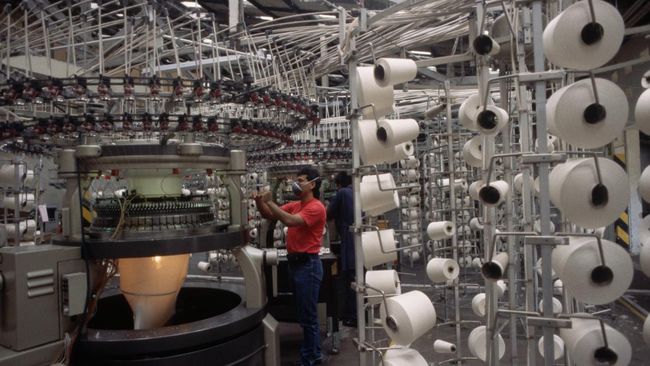Jakarta, CNBC Indonesia – Employers admit they are concerned about the new minimum wage setting regulation for 2023. The new regulation is feared to accelerate the pace of layoffs (PHK) in the country.
As is known, the Minister of Labor (Menaker) Ida Fauziyah issued the regulation of the Minister of Labor (Permenaker) n. 18/2022 relating to the setting of the minimum wage for 2023.
In this provision, a special formulation is applied to determine the minimum wage increase in 2023. With a maximum limit of 10%.
“Departing from growing aspirations, the determination of the minimum wage through the Government (PP) No. 36/2021 on wages is considered to have failed to accommodate the impact of the socio-economic conditions of the community. The wage it is not balanced with the rate of increase in commodity prices and results in a reduction in the purchasing power of workers,” Ida said in a Ministry of Labor YouTube broadcast, quoted on Tuesday (22/11/2022).
The government’s decision made the entrepreneurs “revolt”. The economic players believe that with the issuance of Permenaker n. 18/2022, the government is effectively triggering legal uncertainty. This is because the PP n. 36/2021 has created a dualism of legal umbrellas.
On the other hand, economic actors do not explicitly reject the government’s decision. However, he expressed his disagreement while explaining the current conditions in the domestic business sector.
In particular, labour-intensive industries which are currently experiencing mass layoffs (PHK). Followed by a drop in export demand.
“If indeed (the employers) are no longer able to afford it as they are now, i.e. there are no orders and so on, of course there will always be a gradual reduction in work. If it continues and the losses are continuous, they will survive?” Indonesian Employers Association (APINDO) head of employment and social security Anton Supit told CNBC Indonesia on Tuesday (11/22/2022).
If the situation makes it increasingly impossible for entrepreneurs to bear the brunt of the economic turmoil, it will cause many losses, he continued.
Eventually, the business owner goes out of business and the business owner will still be charged for severance pay. Which is always more burdensome on the part of the entrepreneur.
“If it’s really impossible to contain the situation and the losses will continue. If you suffer losses for that long, eventually they close, you also have to pay severance pay. That’s an even tougher story,” he said. .
Furthermore, he added, there is a work constraint that obliges the company to retain workers with a permanent employment contract (PKWTT).
“If we can’t afford it, let’s get fired,” Anton continued.
According to him, the labour-intensive sector for export destinations will be very vulnerable to the effects of economic turmoil and the occurrence of a wave of layoffs.
“And apparently, yesterday in several discussions with friends, furniture also had problems, electronics were also reduced, although not as big as in shoes. According to them, food and drink also had an effect, but by what percentage I don’t know, ”said Anton.
Meanwhile, the president of the Indonesian Chamber of Commerce and Industry, Arsjad Rasjid, hopes that the new 2023 minimum wage provisions will be implemented by adapting to the conditions of the business sector.
“The minimum wage increase policy in a period should target the industry with the highest economic growth rate or the winning industry in that period. Otherwise, the wage increase policy will be burdensome for the economic actors” , Arsjad said in a statement. , Tuesday (11/22/2022) .
Labor complaints
Meanwhile, the workers have asked the commercial actors to implement Permenaker No. 18/2022 and not to impose PP n. 36/2021.
Indeed, the president of the Confederation of Indonesian Trade Unions (KSPI) Said Iqbal has demanded that the new wage provisions not only apply in 2023. However, for the next one.
“Of course Permenaker No. 18/2021 will be the basis for the next law, not only this year. At least until a new regulation is issued, namely the Omnibus Law on the employment cluster, another decision will be made” said Said Iqbal.
He also called on the Wage Council to fight for a minimum 2023 minimum wage increase of 10%. If more than 10%, it is the result of the negotiation.
“So the Labor Party and trade union organizations have called on the UMK at district/city level and the UMP at provincial level to fight for a minimum 10 per cent increase,” he said.
On the other hand, he said, calculating wage increases can be done in 2 ways, as opposed to Pemenaker-style formulation no. 18/2022 which is considered complicated.
Namely, by setting an increase in the minimum wage equal to the amount of inflation plus the economic growth of the Republic of Indonesia.
Or, use standard cost-of-living figures.
“Where for Indonesia the standard living cost is called decent living needs (KHL), which consists of 64 KHL items. Starting from the price of meat, rice, clothes and so on. The results of this survey on decent living needs are what is negotiated at the Wage Council to be recommended to Regents/Mayors and Governors,” he concluded.
Meanwhile, with the issue of Permenaker n. 18/2022, the determination of the provincial minimum wage (UMP) for 2023, which should have been set on November 21, 2022, was postponed to 28 November 2022.
Additionally, the city/borough minimum wage is expected to be between November 30 and December 7, 2022.
Next article
One more week, the signal to increase salary is already bright
(daughter/daughter)


